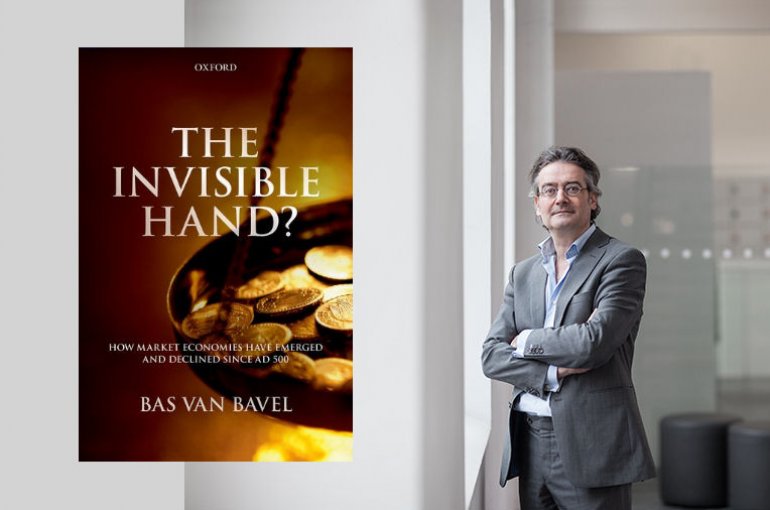”Western market economy has had its time”
Historical investigation into the rise and fall of market economies

The market economy of our Western society is often seen as a condition for continued progress and economic growth, but that turns out to be a misconception. The new book by economic historian Prof. Bas van Bavel of Utrecht University shows that, throughout the ages, all market economies go through a cycle and decline or even disappear after a period of growth. Certain symptoms that always preceded the decline of market economies in the past can be seen in our time as well. This makes it plausible that the end of the Western market economy is near.
Historical investigation
Market economies, which arrange the exchange of goods, capital and land primarily through the market, have been exceptional but some existed much earlier in history. While many economists and policy makers primarily focus on the short term, Van Bavel focused his attention on a period of multiple centuries. This approach showed a surprising picture: it turns out that growth and freedom do not come about thanks to market economies, but largely precede them.
Van Bavel investigated the three most influential market economies of the pre-industrial age: Iraq in the Early Middle Ages (6th-12th centuries), Italy in the High Middle Ages (11th-15th centuries) and the Netherlands in the Late Middle Ages and the early modern period (12th-18th centuries) and compared them to the modern, Western market economies.
Cycle of rise and fall
The investigated market economies all went through the same cycle. First, social movements result in a situation of relatively great social equality and prosperity. This makes the rise of a market economy possible. This market economy initially stimulates the economy even further, but only a small elite primarily profits from that and, as a result, acquires political power as well. The consequences of this are increasing inequality and an increasing lack of freedom. Speculation by the elite, who invest increasingly less money in production and increasingly more in financial markets and the acquisition of political influence, finally herald the phase of economic decline and result in the disappearance of the market economy.

The end of our market economy?
This historical pattern can be applied to the present as well, Van Bavel states. Presently, the United States, the United Kingdom and Western Europe are the prominent market economies. The symptoms that always heralded the decline of a market economy in the past can be seen in the present as well: for instance, the wealth inequality in Western society has increased in the past decades (Van Bavel spoke about this in the media on different occasions, like here and here), and a small elite uses their money to exert political influence as well. In America, examples of this can be seen in the financing of election campaigns and in the influence media tycoons have on public opinion. The bursting of speculation bubbles on financial markets is also a sign that our market economy is nearing its last phase.
Historically, there is not a single instance of a market economy that managed to escape this cycle. In all cases, we see economic stagnation, increasing material inequality, political inequality and finally the disappearance of markets. It is unlikely that our current market economy will escape this fate.
Research theme Institutions for Open Societies
Van Bavel's research falls within Utrecht University's interdisciplinary research theme Institutions for Open Societies. Within this theme, research is conducted on the formal and informal rules of human action. These institutions such as laws, customs, networks, organizations, enable or constrain the realization of an open, democratic and equitable society. They also determine a society’s ability to absorb shocks and its sustainability. By combining expertise from several disciplines, and obtaining a deeper understanding of their institutional underpinnings, Utrecht University is contributing to the development of open and resilient societies in the world.
- Title: The Invisible Hand? How Market Economies have Emerged and Declined Since AD 500
- Author: Bas van Bavel
- Publisher: Oxford University Press, July 2016
- ISBN: 9780199608133

